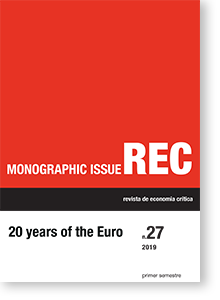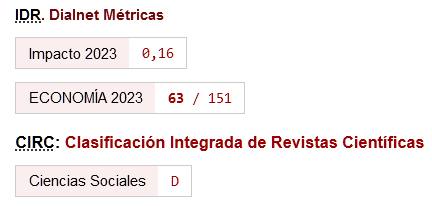The Euro System and the Overall European Project: Failure or Fully-Fledged Success?
Resumen
Some critical economists appear to believe that the European monetary union (EMU) has gone somewhat astray, and that the working of the euro area could be made significantly better if only the flawed nature of a few key theoretical underpinnings of the project was duly recognized. Quite to the contrary, it is maintained in this article that EMU has indeed been fully successful from the point of view of its actual objective, which has never been that of increasing the overall welfare of the majority of the population concerned. In the light of actual experience, EMU can be interpreted as a deliberate project to undermine wage earners’ bargaining power throughout the Continent. The building of the euro system is shown in the article to have been but the way in which the epoch-making policy shift suffered by advanced capitalism as a whole since the early 1980s was brought about in continental Europe. Differently from the USA and the UK, in continental Europe that shift, with its attack on the material living conditions of wage earners, developed gradually and indirectly through the progressive draining away of national economic sovereignties. It is the removal of the nation state, coupled with the absence of a supranational political power, that the building of the euro system has largely achieved. The preservation and strengthening of this double absence is what the strenuous safeguard of the system is currently aiming at.
Descargas
Citas
Barba, A. & De Vivo, G. (2013): "Flawed currency areas and viable currency areas: external imbalances and public finance in the time of the euro", *Contributions to Political Economy*, Vol. 32, pp. 73-96.
https://doi.org/10.1093/cpe/bzt003
Barba, A. & Pivetti, M. (2016): *La scomparsa della sinistra in Europa*, Reggio Emilia, Imprimatur.
Bosch, G., Mayhew, K. & Gautié, J. (2010): "Industrial relations, legal regulations, and wage setting", in J. Schmitt and J. Gautié (eds), *Low-Wage Work in the United States and Europe*, New York, Russel Sage.
Bosch, G. & Weinkopf, C. (eds, 2008): *Low-Wage Work in Germany*, New York, Russel Sage.
Cesaratto, S. (2017): "Alternative interpretations of a stateless currency crisis", *Cambridge Journal of Economics*, Vol. 41, January, pp.977-998.
https://doi.org/10.1093/cje/bew065
Cesaratto, S. & Stirati, A. (2011): "Germany in the European and global crises", *International Journal of Political Economy*, Vol. 39, n. 4. pp. 56-87.
https://doi.org/10.2753/IJP0891-1916390403
Commission of the European Communities (1970): *Report to the council and the commission on the realization by stages of economic and monetary union in the community (Werner report)*, *Bulletin of the European Communities*, 3, 11 (supplement).
Commission of the European Communities (1977): *Report of the study group on the role of public finance in European integration (MacDougall report)*, *Bulletin of the European Communities*, April.
Committee for the Study of Economic and Monetary Union (1989): *Report on economic and monetary union in the European Community (Delors report)*, Luxembourg, Office for Official Publications of the European Communities.
Committee on the working of the monetary system (1959): *Report (Radcliffe report)*, London, HMSO.
Fratzcher, M. (2016): *Verteilung Kampf. Warum Deutschland immer ungleicher wird*, München, Hauser Verlag.
https://doi.org/10.3139/9783446444669
Jenkins, R. (1977): *Europe's present challenge and future opportunity*, Jean Monet Lecture , Florence, European University Institute (also in Lloyds Bank Review, n. 127, 1978).
Knuth, M. (2013): *Le riforme del mercato del lavoro e il 'miracolo dell'occupazione' in Germania*, Comitato economico e sociale europeo, Bruxelles.
Marjolin Report (1979): *European Economic and Monetary Union*, *European Documentation*, March.
Pivetti, M. (1996): "Maastricht and the political independence of central banks: theory and facts", *Contributions to Political Economy*, Vol. 15, pp. 81-104.
https://doi.org/10.1093/oxfordjournals.cpe.a014050
Pivetti, M. (1998): "Monetary versus political unification in Europe. On Maastricht as an exercise in 'vulgar' political economy", *Review of Political Economy*, Vol. 10, n. 1, pp. 5-25.
https://doi.org/10.1080/09538259800000045
Pivetti, M. (2011): "On facts and theory: some reflections prompted by the EMU experience", in R. Ciccone, C. Gehrke & G. Mongiovi (eds), *Sraffa and Modern Economics, Volume II*, London and New York, Routledge.
Pivetti, M. (2013): "On the gloomy European project: an introduction", *Contributions to Political Economy*, Vol. 32, pp. 1-10.
https://doi.org/10.1093/cpe/bzt002
Pivetti, M. (2017): "Per una finanza a servizio dell'economia reale", *MicroMega*, n. 4, pp. 183-96.
Rosanvallon, P. (2018) : *Notre histoire intellectuelle et politique, 1968-2018*, Paris, Seuil.
Salverda, W. & Mayhew, K. (2009): "Capitalist economies and wage inequality", *Oxford Review of Economic Policy*, Vol. 25, n. 1, pp. 126-54.
https://doi.org/10.1093/oxrep/grp008
Tooze, A. (2018): *Crashed : How a Decade of Financial Crises Changed the World*, New York, Viking.
Descargas
Publicado
Cómo citar
Número
Sección
Licencia
Esta licencia permite a terceros compartir (copiar y redistribuir el material en cualquier medio o formato) y adaptar (remezclar, transformar y crear a partir del material para cualquier finalidad, incluso comercial), siempre que se reconozca la autoría y la primera publicación en esta revista (La Revista, DOI de la obra), se proporcione un enlace a la licencia y se indique si se han realizado cambios en la obra.







